Curious about following the world’s best diet, while eating delicious food and never feeling hungry? There are many reasons the US News and World Report recently selected the Mediterranean diet as #1 among the 40+ diets they examined. In today’s post, we dig into this important question: What is the Mediterranean diet and how to follow it?
I put together a simple and complete resource that will help you start and enjoy this delicious way of eating. And be sure to check out my top 50+ Mediterranean diet recipes.
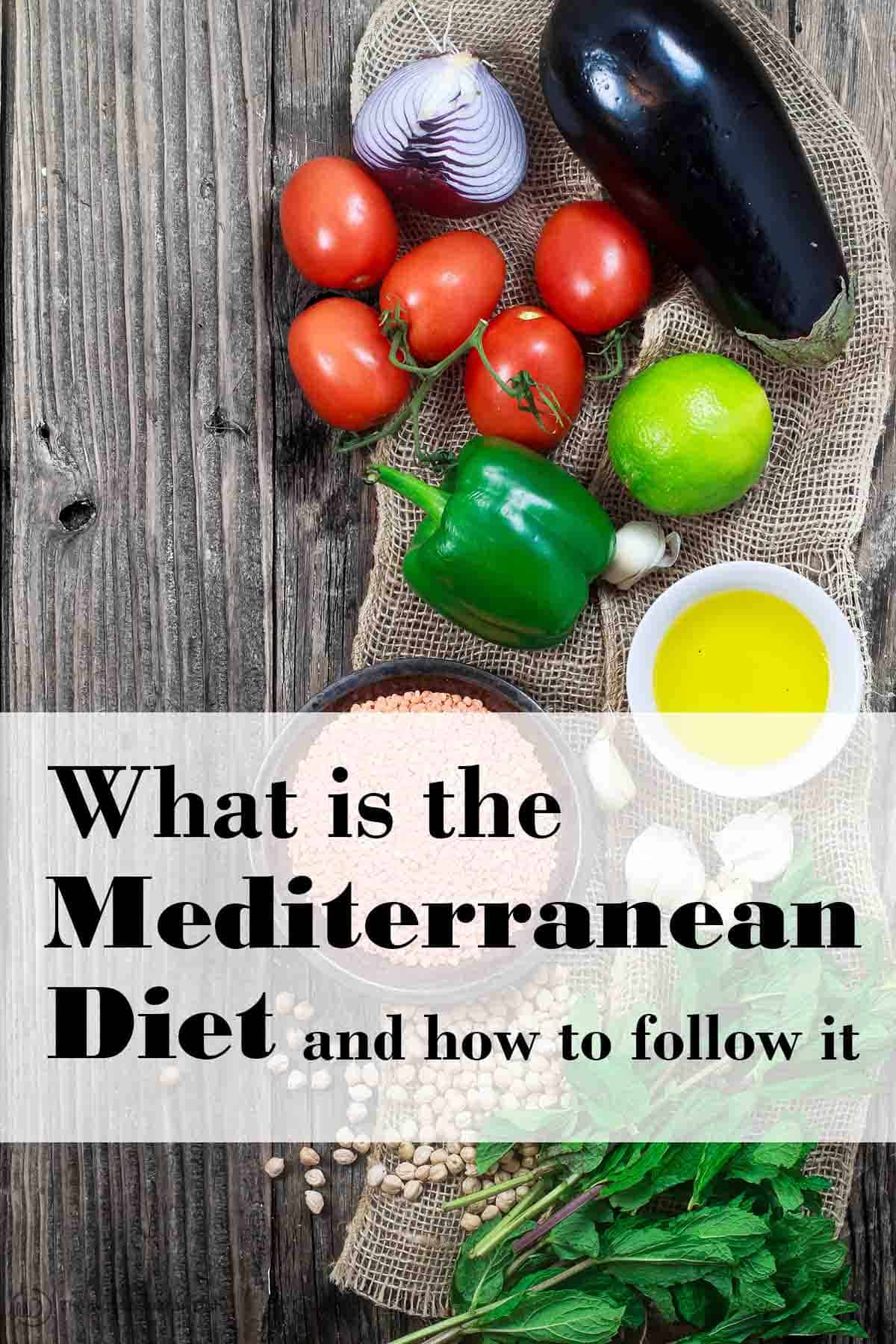
What is the Mediterranean diet?
The Mediterranean diet or way of eating is a plant-heavy diet that focuses more on vegetables, fruits, whole grains, beans, nuts and legumes with some lean proteins from fish and poultry, and good fats from things like extra virgin olive oil. As you see at the very top of the Mediterranean diet pyramid are red meats and sweets which are enjoyed less frequently.
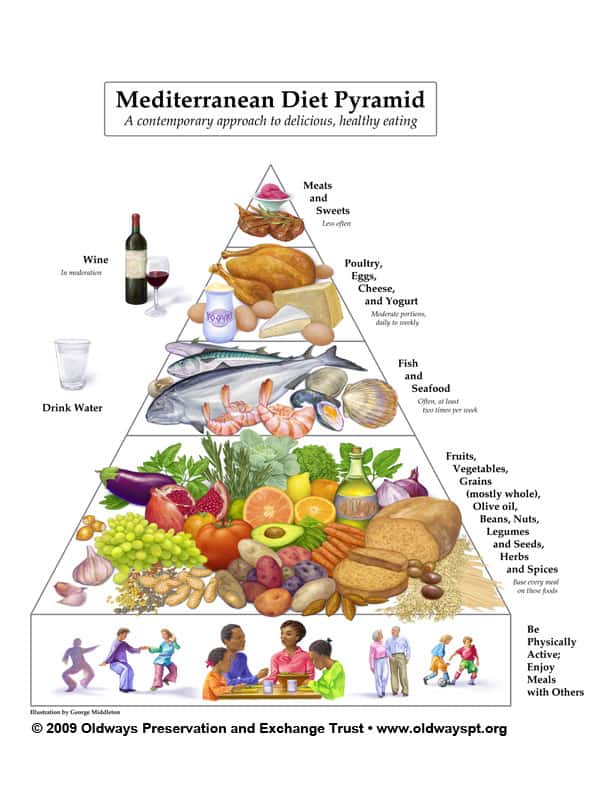
Not a diet, but a sensible way to eat…
The word “diet” comes with certain assumptions–a set of rigid rules to follow that may have you counting calories and avoiding food groups that your body needs. Thankfully, that is not what you’ll find when eating the Mediterranean way.
As Oldways expert Kelly Toups, MLA, RD, LDN, explained: while many diets in the common sense of the word are rooted in deprivation, the Mediterranean diet is a joyful way of eating that celebrates good foods, while keeping a strong focus on flavor and the pleasure of the table.
What do you eat on the Mediterranean diet?
- Eat MORE (every day) leafy greens, vegetables, fruits, whole grains, beans, nuts, and legumes.
- Eat MODERATELY (weekly) lean proteins from fish, some poultry, and eggs.
- Eat LESS Red Meats and Sweets. Red meat is consumed less frequently and also in smaller amounts. a
- Use Extra Virgin olive oil regularly.
- Avoid processed foods, too much sugar, and any products with a list of ingredients you don’t understand or can’t read very well.
Advice for beginners
If you’re brand new to eating the Mediterranean way, expert Kelly Toups, MLA, RD, LDN says, “begin with simple swaps.”
- The first week, buy some quality extra virgin olive oil and start using olive oil as your primary cooking oil (in place of butter, lard or other oils).
- The next week, try and incorporate 1 or 2 fish or seafood based meals, and/or 1 or 2 meatless meals. Stock up on healthy snacks and items like hummus and veggies, as well as fresh or dried fruit.
- For dessert, replace that piece of cake with a fruit or a handful of dried fruit like apricots, figs, or cherries next to a small piece of traditionally produced cheese like feta, Parmigiano-Reggiano or Pecorino Romano.
7 ways for how to follow the Mediterranean diet (Recipes Included):
- Eliminate fast and processed foods. For many of us living in America, this is one of the tougher adjustments and may take some time. To start with, try swapping a fast-food meal with a homemade one. For example, if it’s chicken wings you crave, make them Greek-style like in this recipe! Or if it’s sweet potato fries (my personal guilty pleasure), try baking them in olive oil with a sprinkle of Mediterranean spices like in this recipe. And so on! The point is, find a healthier homemade alternative to your favorite fast foods.
- Eat more vegetables, fruits, grains, and legumes. The base of the Mediterranean diet pyramid should make up the base of every meal. When you can, opt for vegetarian entrees like this Cauliflower and Chickpea Stew or Spicy Spinach and Lentil Soup. Rely more on satisfying, flavor-packed salads to make up a good portion of your plate. Some ideas: Kindey Bean Salad; Mediterranean Chickpea Salad; Greek Salad; Balela Salad.
- Swap fats. Rely on healthy fats. A good place to start is to swap your butter with good olive oil in your cooking.
- Reduce your intake of fatty red meats…a lot. Eat more lean proteins–fish about two times a week; and poultry in moderation. A few favorites are this Easy Baked Salmon; Shrimp Skewers; One-Pan Halibut and Vegetables; Mediterranean Grilled Chicken; and Egg Shakshuka!
You can certainly still eat red meat on occasion (very limited), but choose leaner cuts. Lamb is often the red meat of choice in Greece and other Mediterranean countries. You might like to try: Kofta Kebobs; Grilled Lamb Chops with Mint Quinoa; or Moussaka (Greek eggplant and lamb casserole). For special occasions, I highly recommend Leg of Lamb with Potatoes. - Eat some dairy and eggs. Consumption of dairy products (in moderation) provides health benefits including lower risk of diabetes, metabolic syndrome, cardiovascular disease and obesity. Sadly, according to USDA, more than 80 percent of the entire U.S. population does not meet the daily dairy intake recommendation! We are not talking about topping everything with loads of processed cheese. But perhaps for a snack, swap your chips for a low-fat Greek yogurt. Add a sprinkle of feta cheese to your salad, or swap mayonnaise or your sandwich spread for low-fat Tzatziki sauce.
- Do not drink your calories. In the Mediterranean diet, this translates to drinking more water and swapping calorie-laden Margaritas for an occasional glass of red wine.
- Share as many meals with others as possible. This helps in several ways. Spending time with loved ones reduces stress and elevates our moods. But being deliberate, and slowing down to socialize with others also allows us to control our portions.
Mediterranean diet recipes & other resources
To help you get started, here are some important resources:
- 50+ Top Mediterranean diet recipes
- Mediterranean diet breakfast
- Mediterranean diet shopping list
- Mediterranean diet food list: 5 foods you need
VISIT OUR ONLINE SHOP FOR QUALITY OLIVE OILS, ALL-NATURAL SPICES AND MORE
*This post originally appeared on this site in 2017, it has been revised and reposted with new media and information for readers’ benefit. A special thanks to Oldways and Kelly Toups, MLA, RD, LDN for lending expertise. Readers assume full responsibility for consulting a qualified health professional regarding health conditions or concerns before starting a health program, new way of eating, or diet.
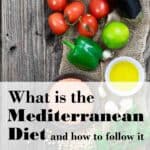
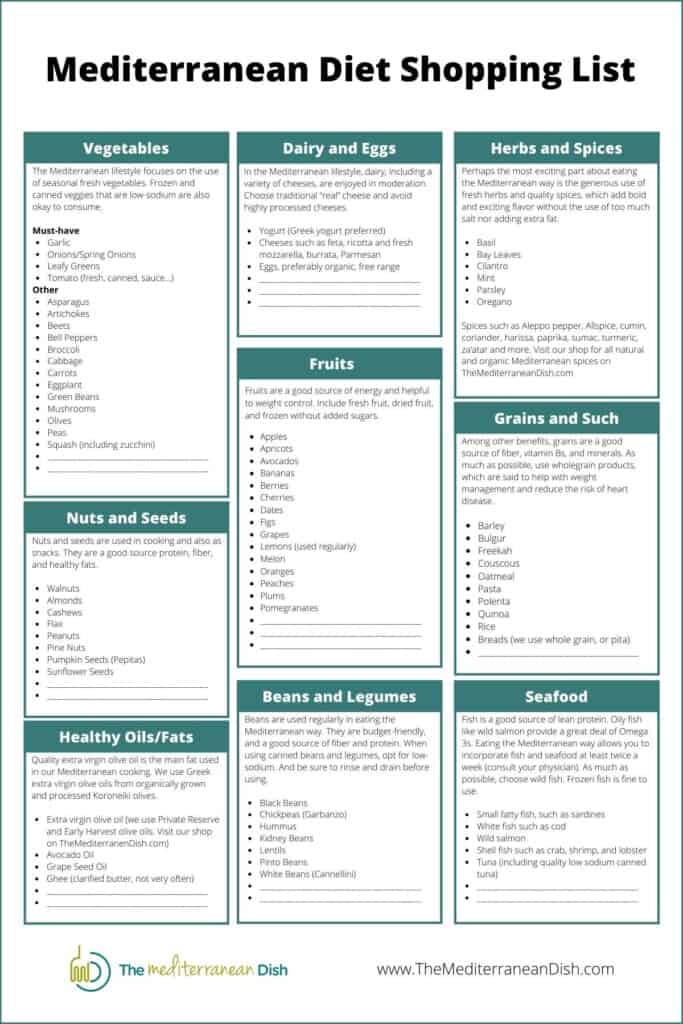
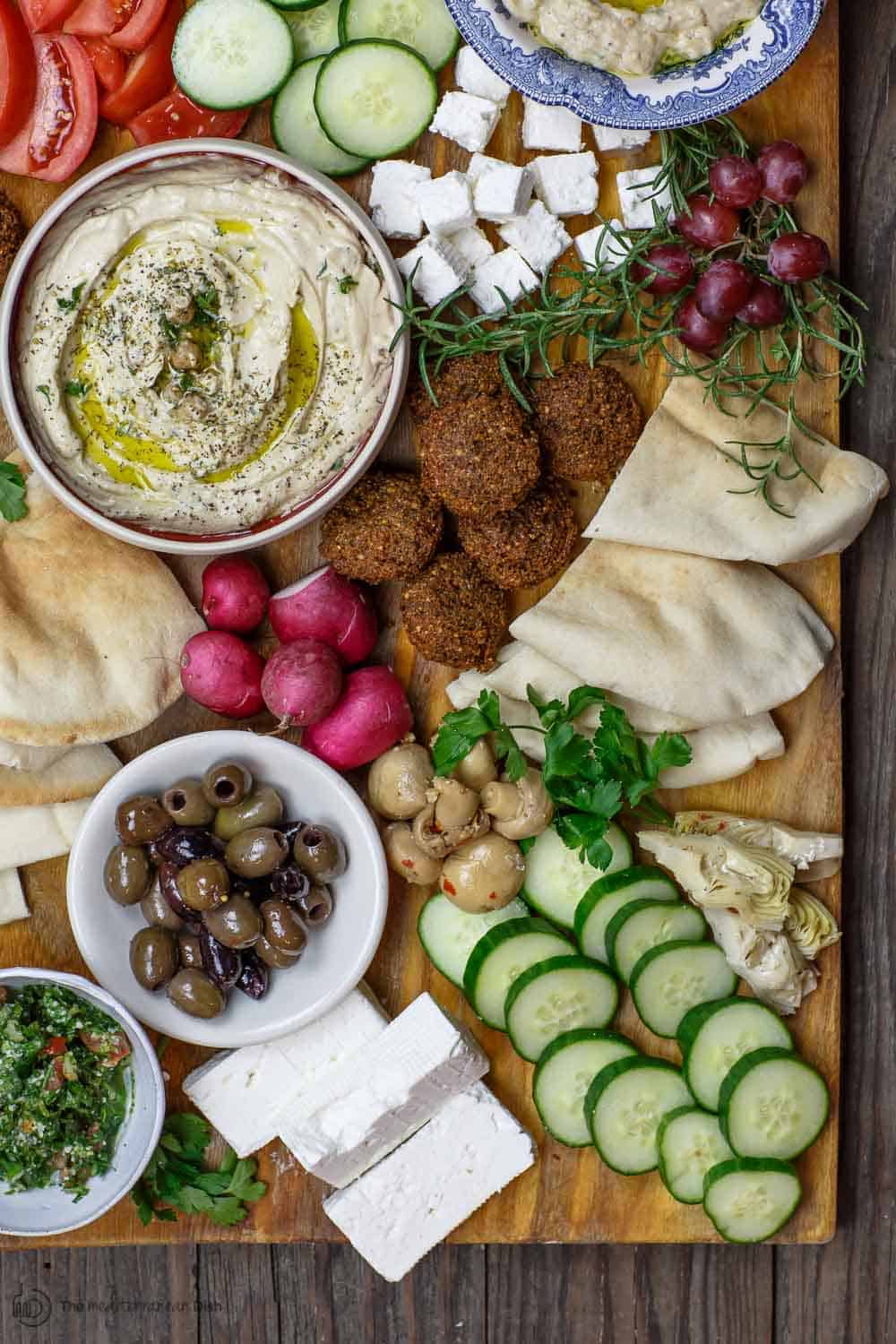
I printed your reciepes for the four weeks. Tells you how many servings but not amount to put in dish ..printed the free one
You are quite the celebrity in our house! Six months ago I had open heart surgery, and had to make major changes in my diet and exercise program. My cardiologist introduced the term “Mediterranean Diet” and we (my wife and I) started scouring the internet. Fortunately we came across your website and didn’t have to do any more research. Without exception, every single recipe is a gold-medal winner. We are constantly amazed at how many deliciously perfect recipes you have created, and continue to create, at an incredible pace.
I was thrilled when I found your recipe for musakhan. I had this dish when visiting the Holy Land a number of years ago in a Palestinian restaurant in East Jerusalem, and tried to find a good version for home use ever since. Your version hit the nail on the head. The pungent flavors of olive oil, onions and sumac with the roasting chicken is unforgettable once you have tasted it.
Now there is another Palestinian dish I am hoping you can help with: maklouba (or some similar spelling.) We are not even going to attempt it until we can try your version.
THANK YOU so much for sharing not only recipes by also your love of life, and for your encouragement to share food with loved ones, or even strangers. You have no idea how much you have enriched our lives!
Hi, Cal! This is Kate from the TMD Team. Thank you so much for your sweet message! I shared it with the team, and we are very touched to hear that Suzy’s recipes have been such a positive part of your recovery and lifestyle changes. It’s wonderful to know that you and your wife have embraced the Mediterranean way of eating and are truly enjoying all of the recipes you’ve tried from our website. While Suzy doesn’t have a recipe for Maglooba published here (yet), you can find it in her first cookbook on page 233. It’s one of her family’s favorite dishes!! Hope you check it out! To your joy and your health!
I’m all in on a healthy diet. So important to me and anxious to learn more.
How would we adjust the diet if we do not eat seafood?
Hi, Becky! Thanks so much for reaching out! If you aren’t seafood eaters, you can definitely compensate by eating a bit more poultry as well as vegetarian/vegan dishes. As you’ve probably noticed, while the Mediterranean way of eating includes moderate amounts of fish and meat, it really emphasizes whole grains, fruits, vegetables, nuts, seeds, and legumes. It’s important to remember that the Mediterranean diet is not a strict set of rules, but rather a guide to healthy eating. It’s okay to make healthy swaps and adjustments to fit your individual preferences and needs.
Hi Suzy…I have just stumbled upon you here and am very excited to try your recipes…..the only 2 things I don’t eat are olives and coriander…what can you suggest as an alternative…TIA
Trish (Australia 🦘)
Hi, Trish. This is really going to depend on the specific recipe. In general, though some good substitutions for olives include: capers, sun dried tomatoes, artichoke hearts, and anchovies. And instead of coriander, you could try: cumin, caraway or fennel… again, depending on the recipe.
I want to try doing the diet
I’m super excited to learn more about the Mediterranean diet!
I love your site and cannot wait to try some of the recipes.
Thanks, Scott! Welcome to The Mediterranean Dish!
I’d love to learn more about eating the Mediterranean way.
Hi, Shawn! Welcome to The Mediterranean Dish! You have come to the right place! Be sure to click here to sign up for our weekly newsletters so you can stay up to date on all the lates recipes and information.
Thank you for accepting my request to be signed up. I’m very excited to start the Mediterranean diet and to have new ideas to make food the healthy way
We are honored to be part of your journey, Deborah! If you ever have any questions, please don’t hesitate to reach out to us at info@themediterraenandish.com!
Hi Suzie, my husband had major heart surgery nearly 12 months ago, I’m struggling with trying to get my head around the Mediterranean way of eating. We are in our seventies and live in Australia, any help you can offer would be appreciated. Also where is your book sold please. Liz
Hi, Liz! You’ve come to the right place. We have several great articles on the Mediterranean diet, like this one :). Another you might find particularly helpful in getting started is our “Mediterranean Diet Meal Plan for Beginners.” Also, definitely sign up to receive our weekly email newsletters so you can stay up to day on new info and recipes. If you ever have specific questions, don’t hesitate to email us at info@themediterraneandish.com. Regarding Suzy’s cookbook, I believe it’s available internationally on Amazon.
I have numerous stomach issues and I am not able to eat citrus foods. Some of the foods I am not able to eat include tomatoes, oranges, lemons, and limes. I also don’t eat anything spicy. Do you have substitute recommendations for me? I am also lactose intolerante. I have an OTC I can take for lactose intolerance. I try to avoid it when I can. My bad cholesterol is high and my doctor recommended this diet. I plan to start it as soon as I purchase the proper foods. Your assistance is greatly appreciated!
Many thanks,
Cheri
Hi, Cheri. It’s great that you’re taking steps to follow the Mediterranean diet, which is known for its heart-healthy benefits! Given your restrictions on citrus foods, tomatoes, and spicy foods, there are still plenty of delicious and nutritious options you can include in your diet. You’ll likely want to focus more on veggies like leafy greens, zucchini, eggplant, etc. and non-citrus fruits (think more berries, apples, etc.) to fill the void. When it comes to lactose intolerance, there are many plant-based milks you can use as a substitute (almond, oat, etc.). Of course, it’s important to consult with your doctor or a registered dietitian before making significant changes to your diet, especially if you have certain health concerns. They can provide more personalized advice based on your individual health needs. If you ever need suggestions specifically for one of our recipes, please don’t hesitate to reach out to us at info@themediterraneandish.com.
I am celiac making my food choices somewhat limited. I also have active ulcerative colitis. Several friends and doctors are highly recommending the Mediterranean diet as part of a healing solution. I ran across this website and found it very helpful. Anything more you can share will be extremely useful as I way find my way through all of this. Thank you.
Hi, Jennifer! Welcome! I am Summer and I work here at The Mediterranean Dish. Sorry to hear about your health troubles. We have loads of gluten-free recipes on the site so that would probably be a good place to start. And if you’re looking for more information on The Mediterranean Diet you can read about that here. If you want to search just Mediterranean Diet recipes check them out here. Good luck and happy cooking!
I have been hospitalized with diverticulitis. Now I’m trying to eat health. The lord gave use a list of foods to eat and not eat. The Mediterranean diet comes closest to this. Thank you
Very interested in starting to eat healthier. I’m an occupational therapist in the U.S. and pay off my job is recommending the Mediterranean diet to patients after their stroke or heart diseases.
Hi, David! You’ve come to the right place we have loads of healthy flavorful recipes. Here are a few recipes to get you started: Top 50 Mediterranean Diet Recipes Happy Cooking!
So happy to have this basic information! I have been diagnosed with NAFLD high cholesterol and pre-diabetes. I am extremely motivated to make the switch to this healthy lifestyle! Thank you!
We are honored to be a part of your health journey, Mary! Don’t hesitate to reach out to us here, or by email at info@themediterraneandish.com if you ever have any questions.